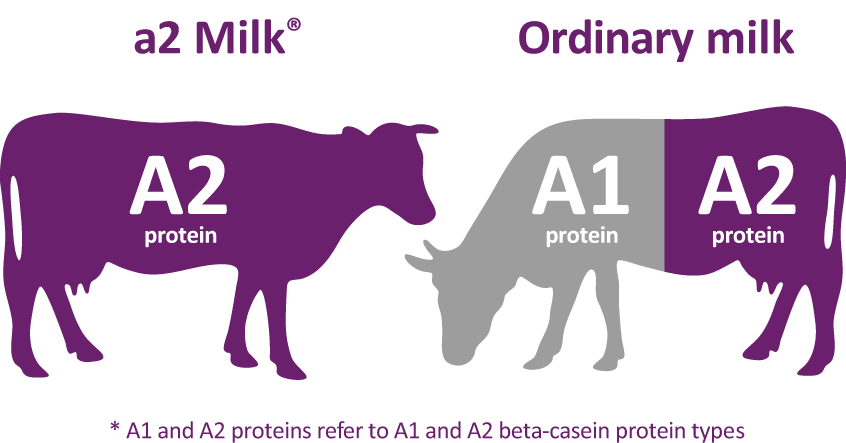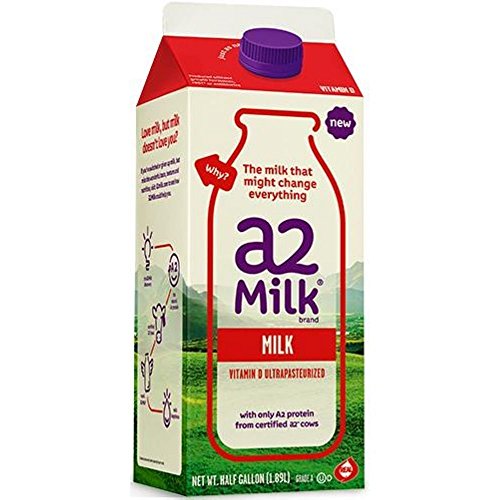Milk contains 3.3.% protein, of which there are 2 main types in milk:
• Whey protein - ~20% of cow's milk protein;
• Casein - ~80% of cow's milk protein, of which the major casein protein is beta-casein (30% of total milk protein) - a chain of 209 amino acids which has 2 major genetic variants: A1 and A2 beta-casein;

Today there are two genetically different milk producing cows - all cows used to produce milk with only A2 beta-casein, but a naturally-occurring genetic mutation in European cows 5,000-10,000 years ago introduced cows that now produce milk that has A1 beta-casein, in addition to A2 beta-casein. Cows that produce A1 beta-casein now provide most of the milk we consume, including infant formula, which is associated with significant inflammatory health problems in some babies.
The difference between A1 and A2 beta-casein? At position #67 chain of amino acids, there is a proline in A2 beta-casein and a histidine in A1 beta-casein.
A1 beta-casein is mostly found in MILK from Holstein Friesian cows (called Holsteins in U.S. or Friesians in the UK) and Ayrshire cows. A2 beta-casein, but not A1, is found in most Jersey and Guernsey cows. Also, goats, water buffalo, sheep and humans produce A2 beta-casein milk.
Casein content is negligible in the highest fat dairy products. E.g butter (80:1 ratio of fat to protein), heavy cream, high-fat cheeses (E.g. parmesan, ricotta; also, the chese-making process may deacivate the "milk gremlin" - see below), or full-fat sour cream and full-fat cream cheese, which can be healthily consumed in moderation;
Bovine A1 milk contains a "Milk Gremlin" (potentially inflammatory BCM-7)
Digestive enzymes in the gut break down A1 beta-casein in milk and release high levels of a potentially inflammation-causing peptide, called beta-casomorphin-7 (BCM-7).
(a) BCM-7 is a strong opioid: This morphine-related, bioactive opioid peptide stimulates a significant release of histamine and other inflammatory cytokines in some people, which can lead to several problems. A2 beta-casein does not release BCM-7.
(b) BCM-7 is a strong oxidant: the stability of BCM-7 combined with the tyrosine molecule at the end of BCM-7 make it a strong oxidant. In vitro BCM-7 shown to oxidize LDL cholesterol, a forerunner to atherosclerosis and ischaemic heart disease. (Steinerova et al, 2004; Torreilles & Guerin, 1995)
BCM-7 doesn't affect everyone.
The inflammation from BCM-7 occurs in those people who:
(1) Lack the digestive enzyme (called DPP-4) to deactivate BCM-7;
and (2) Possibly have a "leaky" gut. An intestinal permeability which allows the large BCM-7 molecule to enter the bloodstream and cause inflammation in different areas of the body. This is a condition which is likely to involve an insufficiency of intestinal probiotic bacteria. BCM-7 in the urine is strongly associated with symptoms of autism (Cade et al, 1999).
If you had chronic tonsillitus, ear and/or chest infections as a child, you may well have inflammatory issues when drinking A1 casein milk. An easy way to test for this possibility is to eliminate A1 casein milk from your diet for 3 months and see if your problems improve.
• Painful or heavy periods
• Intestinal inflammation/discomfort PubMed
• Endometriosis. Lara Briden, naturopathic doctor and author of "Period Repair Manual", states that she has not seen one case that did not improve by avoiding A1 milk
• Fibroids
• Acne, eczema
• PMS
• Autoimmune disease
• Autism / schizophrenia. BCM-7 in the brain exhibits autistic / schizophrenic behaviors. BCM-7 was injected into rats where it was found that BCM-7 in the bloodstream readily passes the blood brain barrier and attaches to opioid receptors. The rats exhibited behavioral tendencies similar to autism and schizophrenia, which could be reversed with a morphine antagonist (naloxone). (Kost et al, 2009; Cieslinska et al 2015)
• Upper respiratory infection. E.g. asthma,
• Allergies
• Type 1 Diabetes / Blood sugar issues. BCM-7 can attach to pancreatic cells and cause autoimmune damage to the pancreas.
Human breast milk contains only A2 beta-casein, and no A1 beta-casein. However, A1 beta-casein may be passed into breast milk from the mother's consumption of A1 milk. Some BCM-7 is likely released in the gut during digestion of human milk
Overall opioid effect of human milk is about one thousandth the potential potency of A1 cows mik. Human BCM-7 has a quite different biochemical structure to BCM-7 in bovine milk, its opioid properties are about 10 times weaker, and BCM-7 is released in quantities < 1% of that released from bovine milk.
"Elevated circulating human BCM-7 has been correlated with beneficial developmental outcomes in breastfed infants, while the opposite has been observed in their formula fed counterparts with elevated bovine BCM-7 levels" (Kost 2009, A2Milk, 2016)
Bovine milk beta-casomorphins shown to have at least ten times more opioid activity than human beta-casomorphins (Brantl 194, Koch 1985, Herrera 1989)
BCM-7 is found in the blood of infants fed high-casein infant formulas
Higher blood levels of bovine BCM-7 found in some infants was correlated with delays in psychomotor development. Some babies can rapidly remove BCM-7 from their systems, others retain it in their bloodstream (Kost 2009)
In a Polish study:
Bovine BCM-7 is found in the blood of breast-fed 1-4 month old babies - researchers suggest that bovine BCM-7 from milk ingested by lactating mothers can be transferred directly to the mothers'milk.
Blood BCM-7 levels in "at risk" apnea infants were on average
three times higher compared with normal infants - also,
"At risk" infants have low blood levels of DPP-4, the enzyme that metabolises BCM-7-
In the "at risk" infants, DPP-4 levels were 58% of those found in healthy babies.
Conversely, BCM-7 was positively associated with DPP-4 levels in the normal infants
(which leads to faster BCM-7 elimination).
(A2Milk 2016, Wasilewska 2011)
A2 milk is available in the US. as "a2 Milk", but unfortunately it is not organic and it is ultrapasteurized for a long shelf life - and although this may not significantly affect vitamin content compared to HTST milk, it does further denature its proteins. Most Jersey or Guernsey cow milk, goat or sheep milk provides A2 milk.
A2Milk (2016) Beta-casomorphin-7 and infants Link
Brantl V (1984). Novel opioid peptides derived from human beta-casein: human beta-casomorphins. Eur J Pharmacol. 106(1), 213-4.
Cade et al (1999) UF Researchers Cite Possible Link Between Autism, Schizophrenia And Diet, UF News Journal, University of Florida. Link
Cieslinska et al, Influence of candidate polymorphisms on the dipeptidyl peptidase IV and μ-opioid receptor genes expression in aspect of the β-casomorphin-7 modulation functions in autism. Peptides (Mar 2005) 65:6-11 PubMed
Herrera-Marschitz M, Terenius L, Grehn L, Ungerstedt U (1989). Rotational behaviour produced by intranigral injections of bovine and human betacasomorphins in rats. Psychopharmacology. 99(3), 357-61.
Koch G, Wiedemann K, Teschemacher H (1985). Opioid activities of human beta-casomorphins. Naunyn Schmiedebergs Arch Pharmacol. 331(4), 351-4.
Kost N.V, Sokolov O.Y, Kurasova O.B, et al. (2009). Beta-casomorphins-7 in infants on different type of feeding and different levels of psychomotor development. Peptides. 30(10), 1854-60. Link
Steinerova A, et al (2004) Letter to the Editor: Significant increase in antibodies against oxidized LDL particles (IgoxLDL) in three-month old infants who received milk formulae. Atherosclerosis 173(1):147-148)
Sun, Cade (1999)
Sun, Cade, Fregly, Privette (1999)
Wasilewska J, Sienkiewicz-Szlapka E, Kuzbida E, et al. (2011). The exogenous opioid peptides and DPPIV serum activity in infants with apnoea expressed as apparent life threatening events (ALTE). Neuropeptides. 45(3), 189-95 Link